Bonds Publishes Research on the Historical Origins of Environmental Inequality
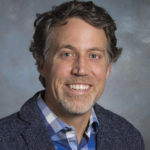
Associate Professor of Sociology Eric Bonds
Associate Professor of Sociology Eric Bonds recently published an article in the journal Environmental Justice on the historical origins of contemporary environmental injustice in Hopewell, Virginia. The tile and abstract are below:
Abstract: There is a growing desire across our country to understand the ways that historical injustices in America’s racist past set the groundwork for today’s racial inequalities. Scholars, students, and activists might meet this moment by doing historical environmental injustice excavation. In order to demonstrate the multiple benefits of this straightforward and accessible case-study method, I present research on Hopewell, a small industrial city in Virginia. As this example shows, such studies can help uncover the locally specific causal pathways that created contemporary environmental injustice, while also providing further evidence that many of today’s environmental inequalities did not arise through happenstance, but are the product of intentional decision-making by White powerholders. And as in the case of Hopewell, further studies may uncover the criminal origins of many ongoing environmental injustices, in which city governments acted in the past with impunity to violate the law in ways that continue to harm people of color today. Finally, such research can help us discover acts of courageous resistance that may push us to rethink when the environmental justice movement was “born.”
Kim Speaks to Free Lance-Star About Census and Diversity
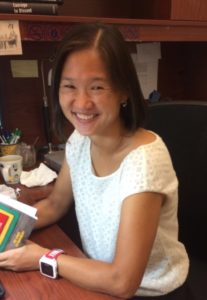
Professor of Sociology Nora Hui-Jung Kim
Professor of Sociology Nora Hui-Jung Kim spoke to The Free Lance-Star about how the recent census report showed that the Fredericksburg area has become more diverse.
Nora Kim, a professor of sociology and anthropology at the University of Mary Washington, said once the wealth of information contained in the latest Census report is completely boiled down, a more precise picture of the impact of population growth on the region can be thoroughly examined and analyzed. But Kim said the region is most likely seeing an influx of minorities as a result of cheaper housing costs, when compared with those available closer to the Beltway.
“They’re spreading down to where they can have access to ethnic communities and ethnic markets in Northern Virginia, but at the same time, have affordable housing,” Kim said.
She said the Fredericksburg region attracts large numbers of government contractors and military personnel who transition in and out of the region.
“Those two sectors tend to attract more minority populations,” said Kim. Read more.
Citeroni Talks Gardening with Richmond Magazine
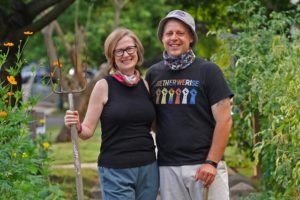
Associate Professor of Sociology Tracy Citeroni and Mark Lewis. Photo courtesy of Richmond Magazine/Jay Paul.
Associate Professor of Sociology Tracy Citeroni was featured in a Richmond Magazine article entitled, “Giving Garden.”
Citeroni has fond memories of planting, harvesting and cooking produce from her family garden, which led her to plant her own gardens wherever she lived as an adult, even if it meant just a few potted tomato and basil plants in an apartment, she says.
Her love for gardening has also flowed into her work as a sociology professor at the University of Mary Washington.
“In the last 15 years or so, this family history began to coalesce with my commitment to social justice and career as a sociologist, and I began to study food justice and explore its academic and activist manifestations,” she says. “When Mark and I moved into our house and began working on the garden, we both became enamored of the idea of a front yard garden to share with neighbors.” Read more.
Bonds Discusses Human Rights on ‘With Good Reason’
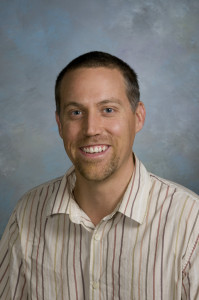
Associate Professor of Sociology Eric Bonds
Associate Professor of Sociology Eric Bonds will appear on the upcoming “With Good Reason” show Saturday, April 24 – Friday, April 29. With Good Reason airs Sundays at 2 p.m. on Fredericksburg’s Radio IQ 88.3 Digital and at various times throughout the week on stations across Virginia and the United States. Check the website for show times.
Protecting Human Rights (April 24, 2021)
Kirsten Gelsdorf (University of Virginia) has spent over 20 years working for the United Nations and other organizations in the humanitarian sector. She discusses her experience in disaster zones and clears up some commonly-held misconceptions about humanitarian aid. And: Earlier this year, Virginia became 1 of only 10 states to pass a Bill of Rights for domestic workers. But Jennifer Fish (Old Dominion University) says while it’s certainly a step in the write direction, these protections often exist only on paper. Jennifer has been named an Outstanding Faculty member by The State Council of Higher Education for Virginia.
Later in the show: According to the Guiness Book of World Records, The Universal Declaration of Human Rights is the most translated document in the world. But it’s not typically taught in American classrooms. Eric Bonds (University of Mary Washington) says we could learn a lot from studying the document and applying its moral framework to our own communities in the United States. Plus: Before the Cold War, UN peacekeeping missions were executed almost entirely by the United States and Great Britain. Now, developing countries have taken the lead in providing manpower to UN peacekeeping forces. Tim Passmore (Virginia Military Institute) says this may signal a larger shift in the global power structure.
Bonds Publishes Updated and Expanded Edition of Social Problems Text
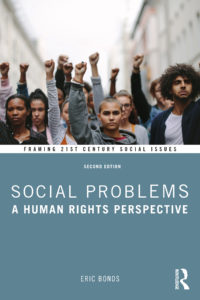 Eric Bonds recently published a second edition of his textbook, Social Problems: A Human Rights Approach with Routledge Press. The book uses an international human rights framework as a jumping-off place to teach students about power and inequality in U.S. society. This revised and expanded edition includes new chapters on human rights and immigration, climate change, and public health. It also includes new discussions on the COVID-19 pandemic and the #BlackLivesMatter movement.
Eric Bonds recently published a second edition of his textbook, Social Problems: A Human Rights Approach with Routledge Press. The book uses an international human rights framework as a jumping-off place to teach students about power and inequality in U.S. society. This revised and expanded edition includes new chapters on human rights and immigration, climate change, and public health. It also includes new discussions on the COVID-19 pandemic and the #BlackLivesMatter movement.
Bonds Mentioned in FLS Article on Rt. 1 Name Change
Associate Professor of Sociology Eric Bonds was mentioned in an article on the Fredericksburg City Council’s resolution to change the name of Jefferson Davis Highway, a measure that was approved 6-1. The General Assembly will discuss the name change at a special session in August. History and American Studies Associate Professor Will Mackintosh has also been a driving force behind the current effort, Bonds said.
Bonds and two students in his political sociology class had asked City Council to make the change because of Davis’ role in the Civil War and the fact that he’d owned more than 100 slaves during his lifetime.
The request evolved out of Bonds’ desire for the students to do a community involvement project that would help them develop democracy skills and not simply vote in an election and then tune out. The class overwhelmingly voted on the renaming project, and researched Davis and the history of the naming of the highway after him. Read more.
Bonds, Students Speak at City Council Meeting on Highway Renaming

Associate Professor of Sociology Eric Bonds
Associate Professor of Sociology Eric Bonds and his students recently spoke at a Fredericksburg City Council meeting to discuss renaming the stretch of Route 1 that runs by the University of Mary Washington, according to an article in The Free Lance-Star.
The name, due to its associations with the Confederacy and slavery, has come under fire in several other localities in recent years. In 2016, UMW Assistant Professor of Sociology Eric Bonds and two students in his political sociology class asked City Council during one of its meetings to rename the highway because of Davis’ role in the Civil War and the fact that he’d owned more than 100 slaves during his lifetime.
The request evolved out of his desire for the students to do a community involvement project that would help them develop democracy skills and not simply vote in an election and then tune out. The class overwhelming voted on this project, and researched Davis and the history of the naming of the highway after him. Read more.
Mary Talks: Eric Gable on ‘An Anthropology of Art’
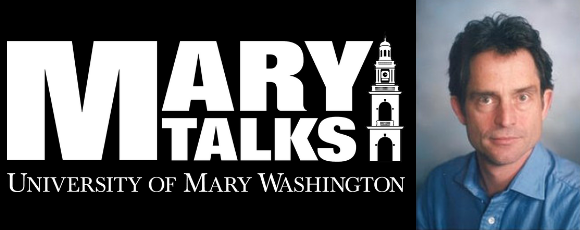
Join us ONLINE for the next Mary Talk of the 2019-20 academic year.
Next in this year’s series is Eric Gable, professor of anthropology and recipient of the 2018 Waple Faculty Professional Achievement Award at UMW, presenting “An Anthropology of Art: Images and Objects from a Cross-Cultural Perspective.”
Professor Gable’s lecture distills his current book project, which delves into anthropology’s long-standing fascination with art and what it reveals about human equality and difference. The lecture is based on an ongoing study of Western art museums and how primitive art–particularly African–has been interpreted therein, and will include material on artistic practices among the people of West Africa and Indonesia, where Gable conducted field research.
Wednesday, April 22
7:30-8:30 p.m.
Online
To watch the Talk online, register here. You then will receive a link to the streaming video, which can be watched live or at a later time. You also will have the opportunity to submit questions to be asked of the speaker at the end of the Talk.
Note: Online viewing is the only option for this Mary Talk, as we are not conducting any in-person events at this time.
We look forward to seeing you online!
Martin Discusses Eagle Resource Closet on WVTF
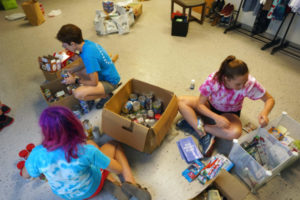
UMW first-years work with CCE Faculty Director Leslie Martin to stock the Eagle Resource Closet, a food pantry on the fifth floor of Lee Hall. Photo by Suzanne Carr Rossi.
Leslie Martin, faculty director of UMW’s Center for Community Engagement and associate professor of sociology, was recently interviewed by WVTF 88.3 Radio IQ about food insecurity among college students and how the Eagle Resource Closet at UMW is addressing this issue.
Many schools around Virginia try to attract students from low-income families with scholarships, grants and loans – but with the cost of living going up, some of those kids run out of cash. That’s prompted universities to open food pantries.
In the attic of an administration building at the University of Mary Washington there’s a large room known as the Eagle Resource Closet. Professor Leslie Martin says you might not know it was there.
“It does provide a lot of privacy,” she explains.
And that’s by design. When the university questioned students they said anonymity was important, and a food pantry was definitely needed.
“We did a survey of students to see how much need there was, and actually almost a quarter of our student population reported being food insecure at some point,” Martin says. Read more.